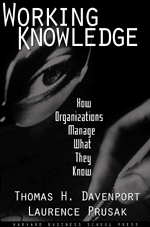|
| ||
 |
A Business Forum Book Review:
Classical economics identified three primary factors of production: (1) land, (2) labor, and (3) capital. These factors were priced in the marketplace as (1) rents for land and other resources, (2) wages for various kinds of labor, and (3) interest rates for capital assets. However, the past 50 years have witnessed the emergence of a fourth element -- knowledge -- as the frequently dominant factor of production. Ranging from the formerly-mundane know-how for the management, collection, processing and disposal of wastes to the complexities of designing, producing, distributing and supporting advanced computer operating systems (e.g., DOS, Windows 95, Windows NT, UNIX, or OS/2), knowledge is increasingly the critical resource in an enterprise, eclipsing the traditional factors of production.We have been inundated over this past year with books, technical papers and professional articles addressing the issues of intellectual capital. Today, we are drowning in a torrent of information. But the challenge is not getting more or better information; the challenge is to get different knowledge.
Working Knowledge: How Organizations Manage What They Know by Thomas H. Davenport and Laurence Prusak (Harvard Business School Press, 256 pages, $29.95) strives to guide managers in recognizing the knowledge that is pivotal to the success of the enterprise and utilizing this knowledge to maximum advantage. "The core message of this book is that the only sustainable advantage a firm has comes from what it collectively knows, how efficiently it uses what it knows, and how readily it acquires and uses new knowledge."
Underscoring that "knowledge is neither data nor information," this work is founded upon the definition:
"Knowledge is a fluid mix of framed experience, values, contextual information, and expert insight that provides a framework for evaluating and incorporating new experiences and information. It originates and is applied in the minds of knowers. In organizations, it often becomes embedded not only in documents or repositories but also in organizational routines, processes, practices, and norms."
Davenport and Prusak emphasize that "knowledge management isn’t rocket science ... It’s good sense and managerial basics. ... knowledge management is [not] totally new." Two decades ago, a client who was the CEO of a creative services firm observed, "Every night, our assets walk out the door." However, knowledge management today calls for a heightened level of executive encouragement, guidance and control.
Working Knowledge recognizes the importance of protecting intellectual property in an intensely competitive global economy, but security is not the primary focus of this book. Rather, the emphasis is upon enhancing organizational knowledge as the foremost asset of the venture. "In contrast to individual knowledge, organizational knowledge is highly dynamic: it is moved by a variety of forces. If we want knowledge to move and be utilized more effectively, we need to better understand the forces that drive it. ... We believe market forces power its movement, working similarly to markets for more tangible goods." The paradigm of a knowledge market within organizations is the key to managing knowledge effectively.
"Like markets for goods and services, the knowledge market has buyers and sellers who negotiate to reach a mutually satisfactory price for the goods exchanged. It has brokers who bring buyers and sellers together and even entrepreneurs who use their market knowledge to create internal power bases. ... People rarely give away valuable possessions (including knowledge) without expecting something in return. ... If the political reality of an organization is such that calculating and secretive hoarders of knowledge thrive, then potential knowledge buyers will have no currency valuable enough to tempt them to share their expertise. ... If it is considered a sign of weakness or incompetence within the culture ... to admit to a problem you can’t solve on your own, then the social cost of 'buying' knowledge will be too high."
Davenport and Prusak offer a practical and realistic handbook for each level of management outlining the steps to be taken today to start generating, organizing and transferring the knowledge within their enterprises. Examples are developed of pilot projects ("entry points") for launching a knowledge management program. The book is enriched with dozens of prominent case studies demonstrating the competitive advantages of knowledge initiatives in the corporate world. Knowledge is power; Working Knowledge is an excellent guide to amplifying the inherent power of any venture.
Your comments and suggestions for these pages are most welcomed!
|
Email: editor@businessforum.com
227 Fuller Street |
URL: http://www.businessforum.com/knowledge.html
Revised: June 10, 1999 TAF
© Copyright 1998, 1999 Thomas A. Faulhaber / The Business Forum Online®, All Rights Reserved